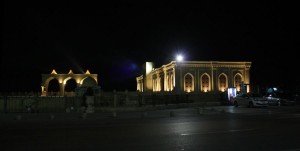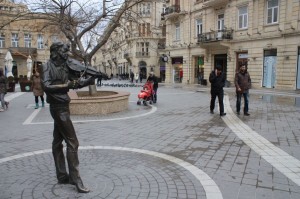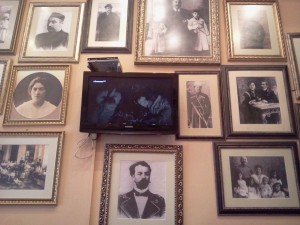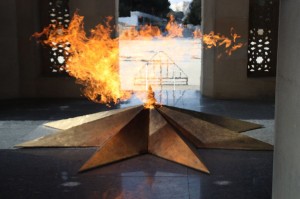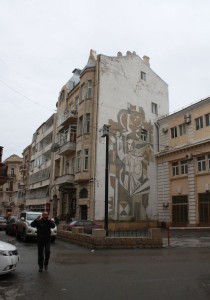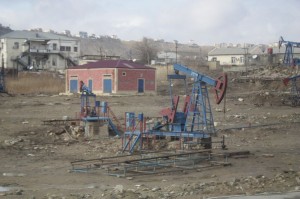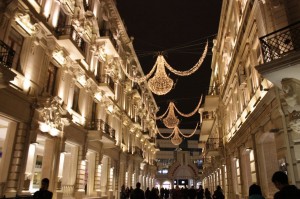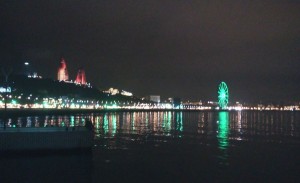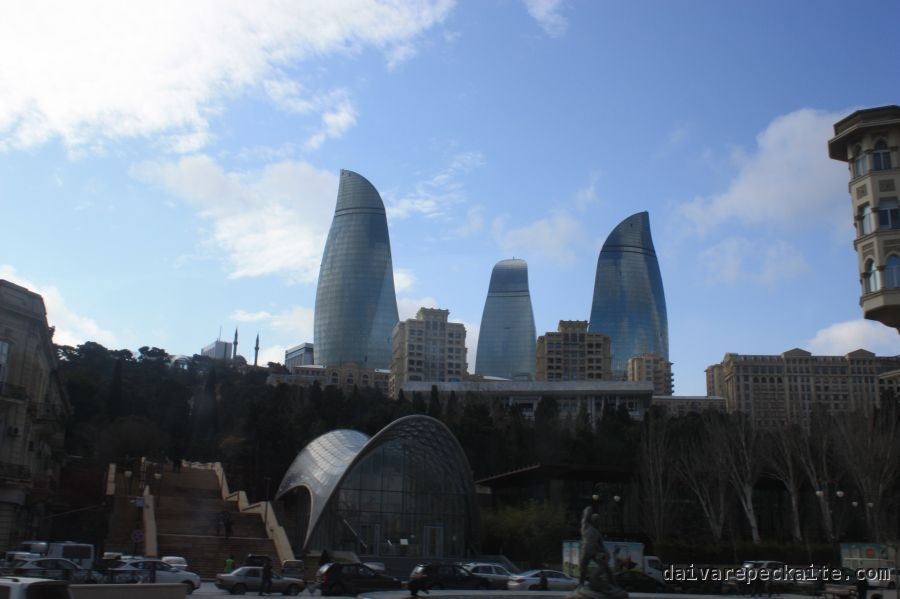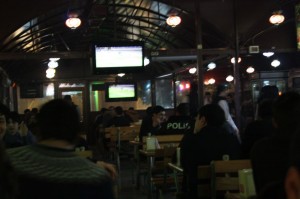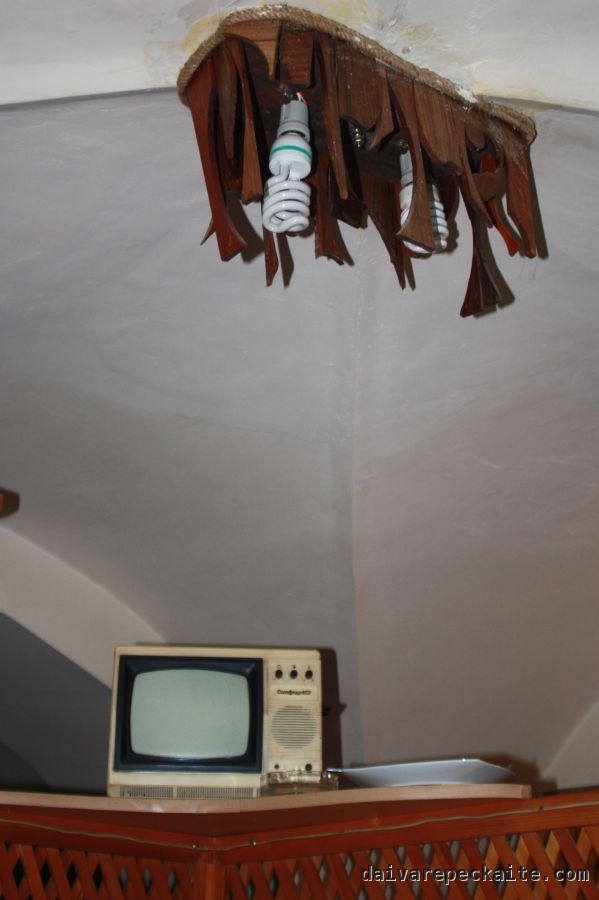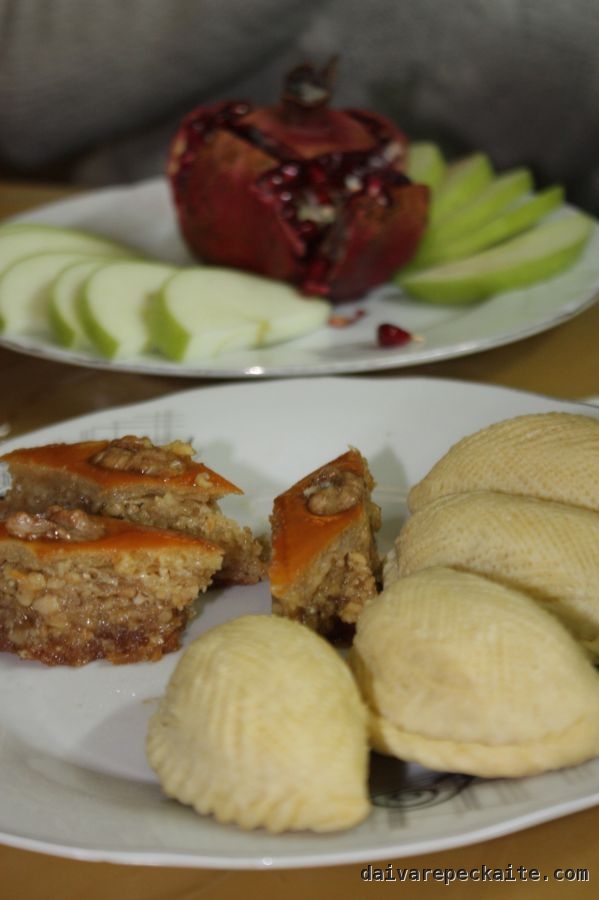As I have written in the previous post, I spent a week in Baku upon invitation from the NATO International School of Azerbaijan. We stayed in the suburb of Shikhov, close to the Caspian sea. Since it’s low season, there were almost no other guests. The hotel is far away from the city center. Although it provides free shuttle services to guests, buses run only once in 1.5-2 hours.
Much of Baku city center was built around the end of the 19th century, so parts of it reminded me of Budapest and Vienna. It turns out that rich families at the time could get tax exemptions by commissioning administrative buildings.
These nostalgic decorations, portraits of early 20th century residents, are a part of the identity of a cafe named after a classical Azerbaijani novel, “Ali and Nino“, a story of an Azeri and Georgian couple during turbulent times. As I was told, it was first published in German, then English, and only later translated into Azeri.
I got an impression that Georgians are widely respected in Azerbaijan and considered to be brothers. Particularly after Russia sliced off a part of Georgia’s territory in 2008. After all, relations with other neighbors are tense. Many people strongly believe that Armenian separatists, who first started raising the question of the separation of Nagorno-Karabakh from Azerbaijan, were funded by the USSR leadership. Visiting Baku, I remembered a blog post by my Israeli friend Yuval, who, being a very liberal artist and often going against the mainstream in his society, admitted to having some subconscious fears as he visited Azerbaijan – only because he was used to imagining alliances along religious lines. Yet politically Azerbaijan and Israel are allies – they share animosity to Iran and various pragmatic considerations concerning energy and stability. A large part of what is considered to be historically Azerbaijan’s territory is a part of Iran nowadays (the heritage of the famous poet Nizami Ganjavi is contested between the two countries), and Azerbaijan’s political leadership fears religious militant groups entering its territory and causing unrest. When Yuval visited Armenia, he was also surprised at the friendly relations of the country with Iran. Although many of my impressions were different from Yuval’s due to the different nature of our visits, I share his observation of the centrality of victimhood to the identity of both Azerbaijan and Armenia, somewhat similar to Israeli and Palestinian narratives. In fact, even visiting the Azerbaijani embassy in Lithuania, I learned more about the conflict in the 90s than about Azerbaijan today.
The Nagorny (Upland) Park is where tourists go for a panoramic view, but for locals this is also a place to honor those who died in Azerbaijan’s various battles. There is a monument to Azerbaijani Soviet soldiers’ contribution in WWII, a monument to soldiers who died during the conflict in Nagorno-Karabakh, as well as an alley of shahids (martyrs), people who died during the Black January Soviet invasion, following unrest in Baku. There is an eternal flame to commemorate those who died during the turbulent 20th century.
Some parts of the city, where, according to a Polish resident there, investment ends, have remnants of the Soviet style.
I remembered that Yuval also ventured off the beaten track and wrote about a town that suffers from oil drilling.
Oil drilling has rich traditions in Azerbaijan, and rich European families used to own the first platforms. This is how all the nice things we saw were funded. When you have this,
You can fund this:
Plus build an impressive skyline and a hall specifically for the Eurovision in 2012.
The red buildings with video projections are the Flame Towers: one hosts offices, one is a hotel, and the third one is a residential building. This is what they look like during the day (the building at the front is a funicular entrance).
Of course I need to say something about the nightlife. I experienced it with my friends from CEU. I learned that many pubs and bars are male-only (it’s a practice, not an explicit rule), but clubs are specifically promoting gender mix and some wouldn’t even let all-male groups in.
Young people in mixed groups often go to Otto (where we also went). Expats gather at Room, where they have a Milanese happy hour on Wednesdays (free snacks for those who buy a drink). The regular visitors of Room seem to have formed a community and know one another. We met a Korean-American couple and chatted with an Italian visitor. English was heard more than other languages.
I spent quite a bit of time walking in Baku alone or with other foreign women, and, contrary to popular Soviet-era stereotypes, there was not a single case of street harassment. Central Baku seems to be very safe. People were extremely helpful and ready to go an extra mile for us. On our last day a Belarusian colleague invited several of us to join her to visit a ‘very local’ restaurant a bit off the main street, called Retro (Said Rustamov str. 6).
It is a smoke-filled place in a basement, a real treasure for ‘nostalgia tourists’. Friendly owners, a middle-aged couple, offered us free qutab (pancake with meat or vegetables), then we ordered some more food. After some time one of the other clients came to talk to us. We were from five countries, and he could name our countries’ soccer teams and their rankings. He said he was happy to see foreigners visiting Baku and bought us a plate of fruit and Novruz cookies.
As we wanted to pay for our food, the owners said it had been taken care of. In fact, I spent very little money in Baku altogether – during all this week I only paid for taxi from and to the airport, bought a few souvenirs for family and friends, and bought one tea and one glass of wine. All other meals, drinks and even things I wanted to buy for myself were paid for by my local friends. Legendary hospitality 🙂


